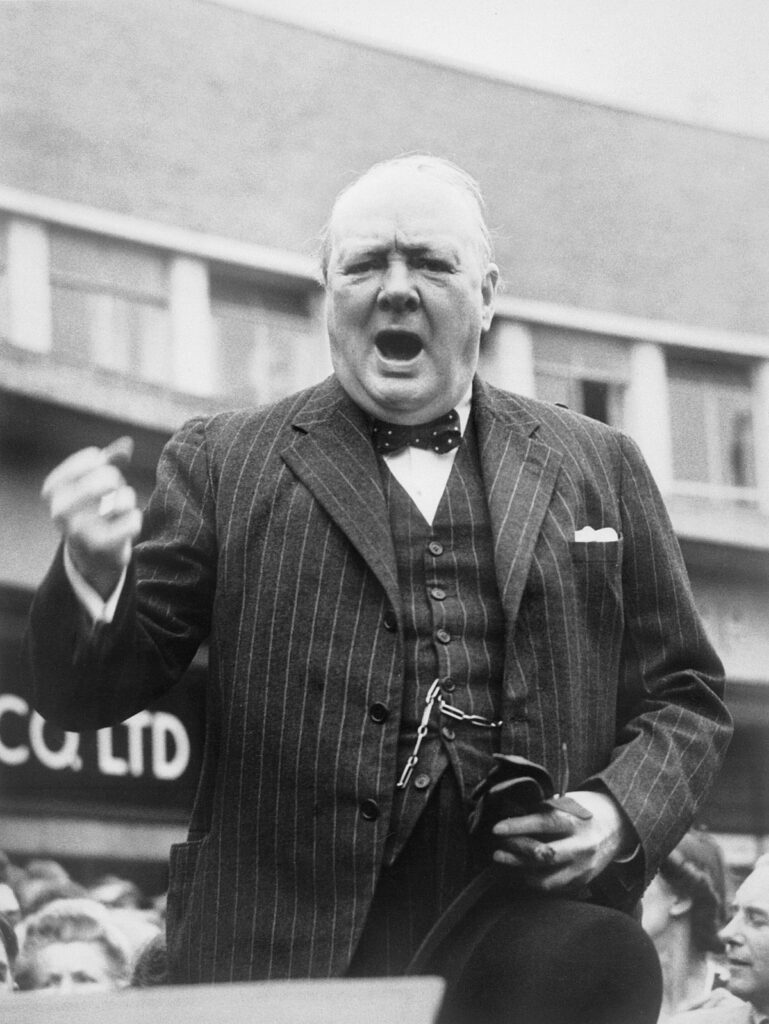Winston Churchill and the Crucible of History
Rich Policz
November 1, 2006

My brothers. I see in your eyes the same fear that would take the heart of me! A day may come, when the courage of men fails, when we forsake our friends and break all bonds of Fellowship, but it is not this day! An hour of wolves and shattered shields when the age of men comes crashing down! But it is not this day! This day we fight! By all that you hold dear on this good earth, I bid you, stand, Men of the West!
—Aragorn, from J.R.R. Tolkien’s Return of the KingThis story shall the good man teach his son;
And Crispin Crispian shall ne’er go by,
From this day to the ending of the world,
But we in it shall be remembered-
We few, we happy few, we band of brothers;
For he to-day that sheds his blood with me
Shall be my brother; be he ne’er so vile,
This day shall gentle his condition;
And gentlemen in England now-a-bed
—William Shakespeare’s Henry V
As we look back through the battlefield of history, the character of Winston Churchill stands as a formidable tower in the barren landscape of modern political philosophy. Here is a man who through rhetoric and example instilled in his people a great courage and a sense of moral urgency in the face of a perilous, engulfing evil. Yet many who study history today would seek to paint Churchill as a racist, war-mongering opportunist. Instead of seeking out what is good about mankind, modern historical scholarship has a tendency to tear apart and deconstruct great historical figures, preferring the lessons of their foibles, weaknesses, and downfalls over any indication of greatness or fixed moral principles.
I should clarify that this is not an attempt on my part to demonstrate the perfection of Churchill. It is merely a call from the wilderness to understand that the study of history ought to be a study on what good mankind can do when it adheres to eternal truths and principles. In fact Churchill himself understood human nature all too well. As Britain slept, dreaming the pacifist dreams of Stanley Baldwin and Neville Chamberlain, Churchill railed in opposition to the wrongheaded approaches of appeasement and disarmament precisely because of his understanding of humanity. At the time, his constant “haranguing” was seen and dismissed as “alarmism” from someone who played with too many toy soldiers as a boy. Surely since mankind witnessed the ghastly horrors of the Great War, they would be loathe to go down that road again. Certainly a more enlightened, and I daresay tolerant, view of the world would win out and human nature would just keep on getting better.
Sadly, as Churchill knew, this would not be the case. He had studied enough history to know that human nature hasn’t changed, and that unarmored tolerance and civility would soon be mowed down by aggressive tyranny. To quote Churchill himself: “Virtuous motives trammelled by inertia and timidity, are no match for armed and resolute wickedness.” History is not an incessant glorious march to a better world. Rather it is a daily struggle; a fight to adhere to principles and ideas that are just and true. It is a war that takes our every ounce of intelligence, courage, muscle, and fortitude to fight and left on our own, the outcome is always in doubt.
Churchill used the rich tradition of the English language to its fullest to defend his island. With the language of Shakespeare, he built a lasting bridge to America by not only appealing to the commonality of language, but the underlying unity of purpose and principle. While he may have been defending Great Britain in the immediate, his rhetoric was showing America and the world that far more was at stake. Should Britain fall, all that it stood for would be burned in the fires of tyranny, and this was something that the moral people of the world must prevent.
What if history had proven Neville Chamberlain right? What if by negotiation and capitulation the Second World War in Europe could have been avoided? Would we now laud and admire Chamberlain in the ways we honor Churchill? I say the answer is no. No, because in a wicked, fallen world compromise with evil tyrants, even if it saves bloodshed, is wrong. Some things are worth fighting for, even if the history books end up showing you on the losing side. Avoidance of bloodshed in itself is no virtue. Lasting peace, sadly, requires sacrifice.
Churchill’s understanding of these things makes him a good man. His ability to emblazon this understanding on the hearts and minds of his fellows makes him a great man. Using every tool at his disposal; his wit, his speech, his writing, his courage, his decency, he was able to arm his countrymen and his allies with more than mere weapons. He was able to arm them with an idea. He recognized that despite flaws, the policy and principle of Britain, and by extension the United States, stands for something deeper; something worth fighting and sacrificing for. A full measure of honor should be given to the individual who willingly steps into the crucible, not because he knows he will win, but because he knows the cause he fights for is just.
Rich Policz is a 1997 graduate of Ashland University and the Ashbrook Scholar Program. He is a freelance writer and teaches philosophy at Ashland Christian School.

